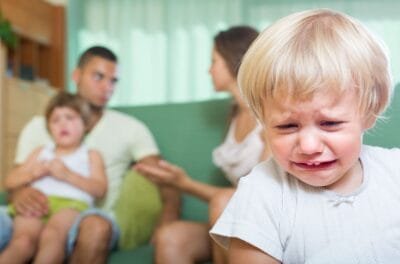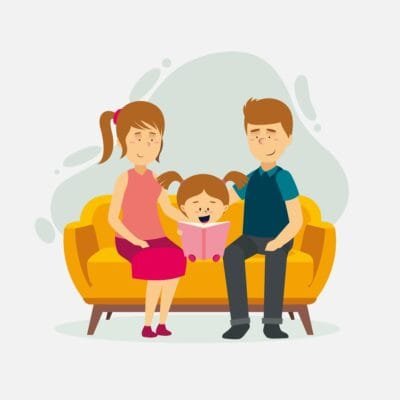In the 20th century, divorce became a prevalent phenomenon, reshaping the landscape of family structures. This blog post aims to empower parents with actionable insights to create a supportive environment. We strive to unravel the reasons behind why divorce affect children and present strategic approaches for parents to navigate this delicate terrain for your lovely children.
While the decision to divorce is undoubtedly complex and deeply personal, its impact on children cannot be understated. The repercussions of divorce on the emotional and psychological well-being of children have been a subject of extensive research, revealing a heartbreaking truth that deserves our attention and reflection.
How Divorce Affect Children of Different Age Groups-
While there’s no telling how any one child will feel about a divorce, their reaction may be influenced by their age. There is no best or worst age for divorce for children to receive the news. Divorce can be an emotional journey that leads to various negative feelings in children such as anger, anxiety, confusion and frustration. Poor academics is a relevant affecting factor of divorce in all the age groups.

- Young children often struggle to understand why they must go between two homes. They may regress into thumb-sucking or bedwetting behavior and exhibit signs of depression.
- Grade school children often don’t understand why their parents divorced, making them feel abandoned by both sides. Their behaviour shall change and some may withdraw from friends and relatives. Without proper explanation, children may start believing that they caused the parents’ separation. The separation from siblings may also cause deep emotional turmoil.
- Teenagers typically grasp the reasons for their parents’ divorce and can adapt to it quickly. However, they may also feel responsible and blame themselves. Anger issues take place and rebel against both of their parents. They also lose faith in the concept of marriage and begin to doubt their different relationships further down the line. Dr. Constance Ahrons, a leading researcher on divorce and its effects, notes, “Children from divorced families often struggle with establishing and maintaining their own intimate relationships.“
Dr. John Gottman, a renowned psychologist, emphasizes the emotional toll, stating,
“Children are made, not broken, by the challenges of their parents’ divorce.”
Case Study on How Divorce Affect Children: The Johnson Family
In a landmark study conducted by researchers at the University of California, the Johnson family’s journey serves as a poignant illustration on why divorce affect children.
Background: The Johnsons, a middle-class family with two children, underwent a divorce when the children were in their early teens.
Findings: Over a span of a decade, researchers closely followed the Johnson children, Sarah and Michael. Despite the amicable nature of the divorce, both children exhibited signs of emotional distress. Sarah, the elder sibling, struggled with forming close relationships, often fearing abandonment. Michael, on the other hand, internalized his emotions, leading to academic challenges and a tendency to avoid social situations.

For some children, parental separation isn’t the hardest part. Instead, the accompanying stressors are what make divorce the most difficult. Changing schools, moving to a new home, and living with a single parent who feels a little disturbed are just a few of the additional stressors that make divorce difficult.
8 Solutions For Divorced Families
Divorce affect children in various ways. It is vital for the parents to create a peaceful and happy environment for their children. Here are some solutions to help you with crucial matters.
- Ensure Positive Co-Parenting – Dr. Edward Kruk underscores the importance of positive co-parenting in minimizing the impact of divorce on children. He emphasizes that children benefit most when both parents actively participate in their lives and providing emotional support.
- Avoid putting kids in the middle– It is inappropriate to ask kids to choose which parent they like best or making them messengers. Due to this habit, they may face anxiety and depression.
- Communicate well with your Ex-partners– Using civil language in front of your children is crucial. It help them feel comfortable and foster a better environment.

- Establish boundaries and create a daily routine – Even though during divorce family dynamics change, it is essential that children maintain their daily routine for them to have a normal life.
- Maintain healthy relationships with other family members – Research shows that healthy parent-child relationship helps kids develop higher self-esteem and better academic performance following divorce.
- Monitor behavioural issues in your children- During teenage years, children become aggressive and impulsive. Hence, both the parents need to keep a close eye on them and be involved.
- Seek education- Parenting strategies shall change. Thus, it is important to learn co-parenting skills and strategies for helping kids cope with the adjustments.
- Get professional help- Individual therapy may help your child sort out his emotions. Family therapy may also be recommended to address changes in family dynamics. Some communities also offer support groups for kids.
Conclusion
As we reflect on the heartbreaking truth of why divorce affect children in the 20th century, it is crucial to acknowledge the complexity of this issue. While divorce is sometimes an unavoidable reality, understanding its far-reaching impact on children is essential.
By fostering open communication, prioritizing the emotional well-being of children, and embracing positive co-parenting practices, we can strive to mitigate the heartbreak that divorce inflicts on the most innocent members of our society.



